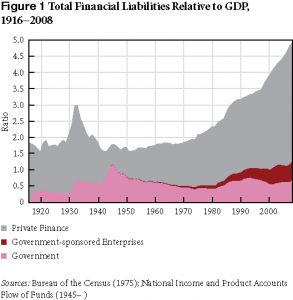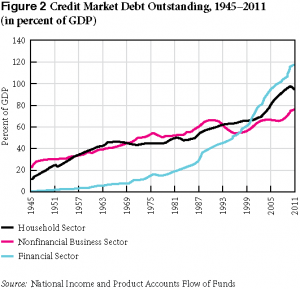Are the Big Banks Insolvent?
byLet’s look at the reasons to doubt that the big six are solvent.
1.The economy is tanking. Real estate prices are not recovering, indeed, they continue to fall on trend. No jobs are being created. Defaults and delinquencies are not improving. GDP growth is falling. Isn’t it strange that Wall Street has managed to remain largely unaffected? Finance is an intermediate good. It is like the tire that goes on a new Ford automobile. Auto sales are collapsing but somehow tire sales to auto manufacturers are doing just fine? Does that make sense? Banks are making no loans, yet, they remain profitable?
2.Not only are the financial institutions NOT doing any of the traditional commercial banking business—lending—they aren’t doing much of the investment banking business either (remember that the last two remaining investment banks were handed bank charters so that they could scoop up insured deposits as a cheap way to finance their business). How many IPOs have been floated? Corporate debt? Trading? Well, one of the two investment banks that survived, Morgan Stanley (the sixth largest bank—barely squeaking into my “dirty half dozen” biggest banks), just released a pretty poor trading outlook—blamed on “high costs, historically low interest rates and market volatility that has pushed clients to the sidelines”. (Reuters Global Wealth Management Summit News).
3.Europe is toast. US bank exposure to Euroland is huge. But US banks are doing just fine, thank you? Hello?
4.Commodities are tanking. Equities markets are at best horizontal. Other than making profits by cooking their books, these were areas open to banks to make profits. And, yes, both commodities and equities had been doing quite well—climbing back up from the depths of the crisis. This should be put in perspective, however, because at best they only recouped losses. Still, those bubbles are now history. Losses are going to pile up. Yes, I know financial institutions hedge their long positions in commodities with some shorts—but who do you short with? Does anyone remember AIG—the insurer of first and last resort? Hedges are only as good as counter-parties, and counter-parties are no better than you are when markets collapse. In a crisis, correlations reach 100%.
5.Hedge funds have not done particularly well over the past couple of years. And yet banks have? Even though all they are doing is trading (plus cooking books and reducing loan loss reserves), the banks are far more successful than hedge fund managers at picking winners? Does that make a lot of sense?
6.And, as mentioned above, they’ve got all these lawsuits—which requires hiring lawyers, paying fees and fines, and employing Burger King kids to falsify documents. The document shredding services alone must be crimping net returns.
Ok, is there any evidence that might cause one to question bank solvency? Real hard stuff?
There is a very good Reuters special report out October 2. And here is a quick summary of some of the data reported:
1.Household debt as a percent of GDP is only down from 100% to 90%. While declining debt ratios are good, it is still too much to service. Consumer debt fell from $12.5 trillion in 2008 to $11.4 trillion now. Take a look at these figures (from a forthcoming Levy Institute policy brief):
Figure 1 shows that total US debt is about five times GDP and Figure 2 provides debt ratios by sector. Financial institutions are still heavily indebted—mostly to one another. At the level of the economy as a whole, it is still a massive Ponzi scheme—that will collapse. Total US debt loads are much higher than the loads across most of Euroland—we make Greece or Italy look like paragons of thrift. Especially if you take government debt out of the equation (which you should do when talking about the US—since we’ve got a sovereign government that issues its own currency), the Europeans are debt pikers.
2.Most of the household debt is linked to real estate—almost three-quarters. 10.9 million homeowners, or 22%, are underwater on their mortgages. 1.6 million are delinquent or in foreclosure processes. Banks still have $700 billion in second lien debt (such as home equity loans). As these are “sloppy seconds”, much of this stuff is worthless. American consumers account for nearly half of the global $9 trillion of securitized loans (ie, mortgage backed securities and so on). There is another $4.1 trillion in mortgage debt sold by Fannie and Freddie. The point is that there is still a phenomenal amount of debt linked to a declining US real estate market, and much of that is either directly held by US financial institutions, or will come back to bite them because of extensive layering of debt across the global financial system. And speaking of these linkages, US banks will have to refinance over $300 billion of maturing debt this year.
3.As Robert Reich correctly argued in a piece, although direct lending by US banks to heavily indebted sovereign European governments is not high, they have exposure of almost $3 trillion through links to European banks. If, say, Greece defaults, US banks get hurt to the extent that European banks default on their debts. US money market mutual funds are also heavily invested in Euroland—about half of their assets are in short-term European bank IOUs.
Note that MMMFs are essentially uninsured deposits that pretend to be as safe as FDIC-insured deposits—and there are $3 trillion worth of them (vs about $6 trillion of insured deposits). When the GFC hit there was a run out of them that threatened to “break the buck”; they were saved by extension of the US government guarantee. That is now illegal by Dodd-Frank (one of the few gutsy things Congress managed to do—essentially inserting a nuclear bomb into the legislation to ensure that the next GFC will blow Wall Street to smithereens). You might say “so what”—let them fail. But they lend to US banks—who need to roll-over short-term paper bought by the MMMFs. Bank finance will dry up in a run. That is the problem with layering. This is not a 3 standard deviation event—it is a high probability event that ought to be taken into account when “stress-testing” banks. Can anyone say “an accident waiting to happen”?
If the financial system survives the next week or two, I’ll provide more evidence that the end is near. Meanwhile, watch those bank stocks!
(cross posted at EconoMonitor)



